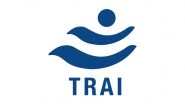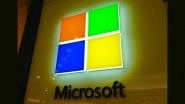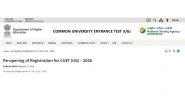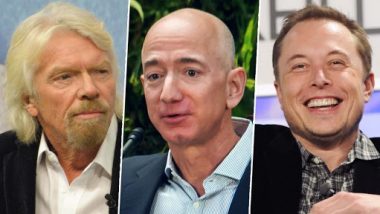Cape Canaveral, Jul 10: Two billionaires are putting everything on the line this month to ride their own rockets into space. It's intended to be a flashy confidence boost for customers seeking their own short joyrides.
The lucrative, high-stakes chase for space tourists will unfold on the fringes of space — 55 miles to 66 miles (88 kilometers to 106 kilometers) up, pitting Virgin Galactic's Richard Branson against the world's richest man, Blue Origin's Jeff Bezos.
Branson is due to take off Sunday from New Mexico, launching with two pilots and three other employees aboard a rocket plane carried aloft by a double-fuselage aircraft. Sirisha Bandla On Virgin Galactic's Space Mission, Ex-AP CM Andhra Pradesh Nara Chandrababu Naidu Applaud Telugu Astronaut.
I’ve always been a dreamer. My mum taught me to never give up and to reach for the stars. On July 11, it’s time to turn that dream into a reality aboard the next @VirginGalactic spaceflight https://t.co/x0ksfnuEQ3 #Unity22 pic.twitter.com/GWskcMSXyA
— Richard Branson (@richardbranson) July 1, 2021
Bezos departs nine days later from West Texas, blasting off in a fully automated capsule with three guests: his brother, an 82-year-old female aviation pioneer who's waited six decades for a shot at space and the winner of a $28 million charity auction. Sirisha Bandla to Fly Into Space Aboard Virgin Galactic Flight, Set to Become Second India-Born Woman to Achieve Feat After Kalpana Chawla.
Branson's flight will be longer, but Bezos' will be higher.
2 days until #Unity22! Watch the launch live this Sunday at 6am PT | 9am ET | 2pm BST with @StephenAtHome @thegreatkhalid @Cmdr_Hadfield @KellieGerardi @virgingalactic pic.twitter.com/tpjIqeVE0L
— Richard Branson (@richardbranson) July 10, 2021
Branson's craft has more windows, but Bezos' windows are bigger. Branson's piloted plane has already flown to space three times. Bezos' has five times as many test flights, though none with people on board.
Either way, they're shooting for sky-high bragging rights as the first person to fly his own rocket to space and experience three to four minutes of weightlessness.
Branson, who turns 71 in another week, considers it “very important” to try it out before allowing space tourists on board. He insists he's not apprehensive; this is the thrill-seeking adventurer who's kite-surfed across the English Channel and attempted to circle the world in a hot air balloon.
“As a child, I wanted to go to space. When that did not look likely for my generation, I registered the name Virgin Galactic with the notion of creating a company that could make it happen,” Branson wrote in a blog this week.
Seventeen years after founding Virgin Galactic, he's on the cusp of experiencing space for himself.
“It's amazing where an idea can lead you, no matter how far-fetched it may seem at first.”
Bezos, 57, who stepped down Monday as Amazon's CEO, announced in early June that he'd be on his New Shepard rocket's first passenger flight, choosing the 52nd anniversary of Neil Armstrong and Buzz Aldrin's moon landing. He too had childhood dreams of traveling to space, Bezos said via Instagram.
“On July 20th, I will take that journey with my brother. The greatest adventure, with my best friend.”
View this post on Instagram
Branson was supposed to fly later this year on the second of three more test flights planned by Virgin Galactic before flying ticket holders next year. But late last week, he leapfrogged ahead.
He insists he's not trying to beat Bezos and that it's not a race. Yet his announcement came just hours after Bezos revealed he'd be joined in space by Wally Funk, one of the last surviving members of the so-called Mercury 13.
The 13 female pilots never made it to space despite passing the same tests in the early 1960s as NASA's original, all-male Mercury 7 astronauts.
Bezos hasn't commented publicly on Branson's upcoming flight. But some at Blue Origin already are nitpicking the fact that their capsule surpasses the designated Karman line of space 62 miles (100 kilometers) up, while Virgin Galactic's peak altitude is 55 miles (88 kilometers). International aeronautic and astronautic federations in Europe recognize the Karman line as the official boundary between the upper atmosphere and space, while NASA, the Air Force, the Federal Aviation Administration and some astrophysicists accept a minimum altitude of 50 miles (80 kilometers).
Blue Origin's flights last 10 minutes by the time the capsule parachutes onto the desert floor. Virgin Galactic's last around 14 to 17 minutes from the time the space plane drops from the mothership and fires its rocket motor for a steep climb until it glides to a runway landing.
SpaceX's Elon Musk doesn't do quick up-and-down hops to the edge of space. His capsules go all the way to orbit, and he's shooting for Mars.
“There is a big difference between reaching space and reaching orbit,” Musk said last week on Twitter.
There is a big difference between reaching space and reaching orbit
— Elon Musk (@elonmusk) July 3, 2021
Musk already has carried 10 astronauts to the International Space Station for NASA, and his company's first private spaceflight is coming up in September for another billionaire who's purchased a three-day, globe-circling ride.
Regardless of how high they fly, Virgin Galactic and Blue Origin already are referring to their prospective clients as “astronauts.” More than 600 have reserved seats with Virgin Galactic at $250,000. Blue Origin expects to announce prices and open ticket sales once Bezos flies.
Phil McAlister, NASA's commercial spaceflight director, considers it a space renaissance, especially as the space station gets set to welcome a string of paying visitors, beginning with a Russian actress and movie producer in October, a pair of Japanese in December and a SpaceX-delivered crew of businessmen in January.
“This next year, it's going to really start moving pretty quickly, so we're really excited about it,” NASA astronaut Shane Kimbrough said from the space station last week.
This is precisely the future NASA wanted once the shuttles retired and private companies took over space station ferry flights. Atlantis blasted off on the last shuttle flight 10 years ago Thursday.
(The above story is verified and authored by Press Trust of India (PTI) staff. PTI, India’s premier news agency, employs more than 400 journalists and 500 stringers to cover almost every district and small town in India.. The views appearing in the above post do not reflect the opinions of LatestLY)













 Quickly
Quickly


